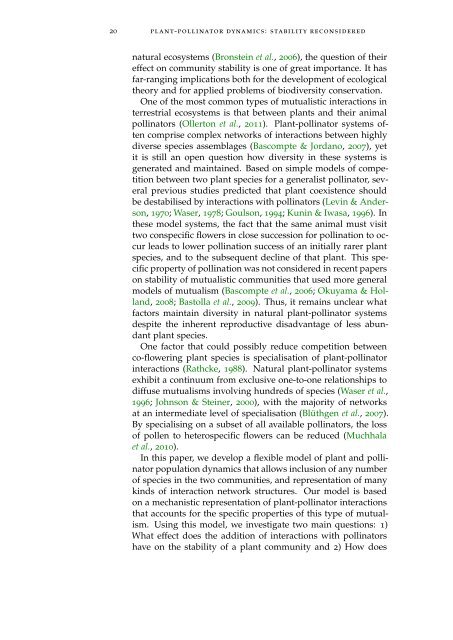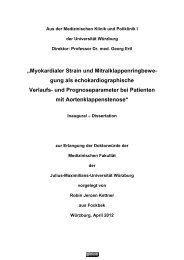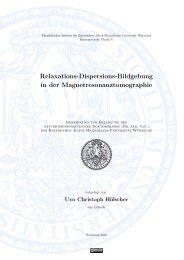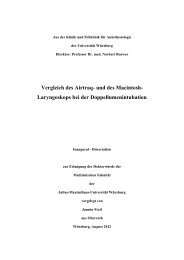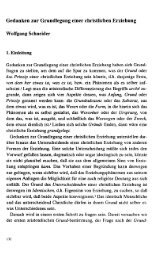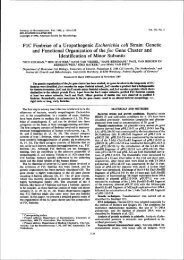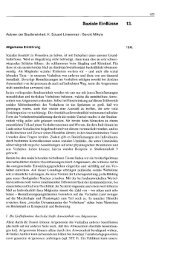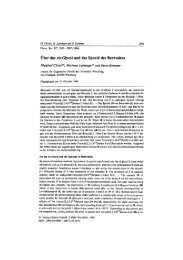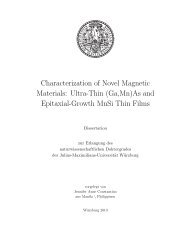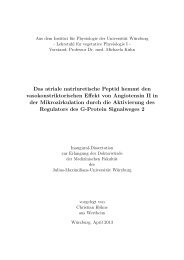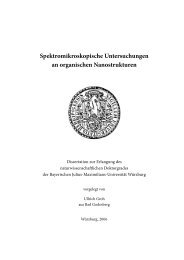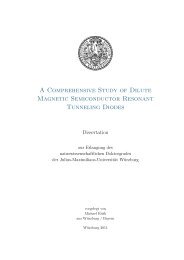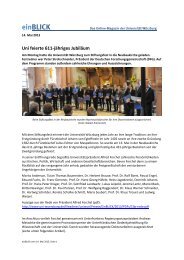Linking Specialisation and Stability of Plant ... - OPUS Würzburg
Linking Specialisation and Stability of Plant ... - OPUS Würzburg
Linking Specialisation and Stability of Plant ... - OPUS Würzburg
You also want an ePaper? Increase the reach of your titles
YUMPU automatically turns print PDFs into web optimized ePapers that Google loves.
20 plant-pollinator dynamics: stability reconsidered<br />
natural ecosystems (Bronstein et al., 2006), the question <strong>of</strong> their<br />
effect on community stability is one <strong>of</strong> great importance. It has<br />
far-ranging implications both for the development <strong>of</strong> ecological<br />
theory <strong>and</strong> for applied problems <strong>of</strong> biodiversity conservation.<br />
One <strong>of</strong> the most common types <strong>of</strong> mutualistic interactions in<br />
terrestrial ecosystems is that between plants <strong>and</strong> their animal<br />
pollinators (Ollerton et al., 2011). <strong>Plant</strong>-pollinator systems <strong>of</strong>ten<br />
comprise complex networks <strong>of</strong> interactions between highly<br />
diverse species assemblages (Bascompte & Jordano, 2007), yet<br />
it is still an open question how diversity in these systems is<br />
generated <strong>and</strong> maintained. Based on simple models <strong>of</strong> competition<br />
between two plant species for a generalist pollinator, several<br />
previous studies predicted that plant coexistence should<br />
be destabilised by interactions with pollinators (Levin & Anderson,<br />
1970; Waser, 1978; Goulson, 1994; Kunin & Iwasa, 1996). In<br />
these model systems, the fact that the same animal must visit<br />
two conspecific flowers in close succession for pollination to occur<br />
leads to lower pollination success <strong>of</strong> an initially rarer plant<br />
species, <strong>and</strong> to the subsequent decline <strong>of</strong> that plant. This specific<br />
property <strong>of</strong> pollination was not considered in recent papers<br />
on stability <strong>of</strong> mutualistic communities that used more general<br />
models <strong>of</strong> mutualism (Bascompte et al., 2006; Okuyama & Holl<strong>and</strong>,<br />
2008; Bastolla et al., 2009). Thus, it remains unclear what<br />
factors maintain diversity in natural plant-pollinator systems<br />
despite the inherent reproductive disadvantage <strong>of</strong> less abundant<br />
plant species.<br />
One factor that could possibly reduce competition between<br />
co-flowering plant species is specialisation <strong>of</strong> plant-pollinator<br />
interactions (Rathcke, 1988). Natural plant-pollinator systems<br />
exhibit a continuum from exclusive one-to-one relationships to<br />
diffuse mutualisms involving hundreds <strong>of</strong> species (Waser et al.,<br />
1996; Johnson & Steiner, 2000), with the majority <strong>of</strong> networks<br />
at an intermediate level <strong>of</strong> specialisation (Blüthgen et al., 2007).<br />
By specialising on a subset <strong>of</strong> all available pollinators, the loss<br />
<strong>of</strong> pollen to heterospecific flowers can be reduced (Muchhala<br />
et al., 2010).<br />
In this paper, we develop a flexible model <strong>of</strong> plant <strong>and</strong> pollinator<br />
population dynamics that allows inclusion <strong>of</strong> any number<br />
<strong>of</strong> species in the two communities, <strong>and</strong> representation <strong>of</strong> many<br />
kinds <strong>of</strong> interaction network structures. Our model is based<br />
on a mechanistic representation <strong>of</strong> plant-pollinator interactions<br />
that accounts for the specific properties <strong>of</strong> this type <strong>of</strong> mutualism.<br />
Using this model, we investigate two main questions: 1)<br />
What effect does the addition <strong>of</strong> interactions with pollinators<br />
have on the stability <strong>of</strong> a plant community <strong>and</strong> 2) How does


